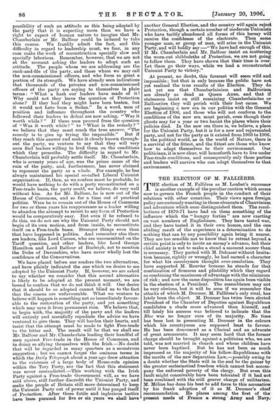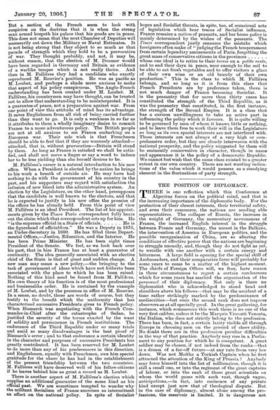THE ELECTION OF M. FALLIERES. T HE election of M. Fallieres
as M. Loubet's successor is another example of the peculiar caution which seems now to govern the French people in the conduct of their relations with other countries. Their views upon foreign policy are curiously wanting in those elements of Chauvinism and adventure which once distinguished them. The recol- lections of 1870-71 have had on them something of the influence which the "hungry forties" are now exerting on vast numbers of Englishmen. They have tasted war, and they have tasted it in their own homes, and the one abiding result of the experience is a determination to do nothing that can by any possibility again bring it nearer. They are too sensible not to know that to retreat beyond a certain point is only to invite an enemy's advance, but their chief anxiety is not to make a stand a moment sooner than is necessary. They parted with M. Deleasse without hesita- tion because, rightly or wrongly, he had earned a character for what his countrymen thought over-resolution. They have supported M. Rouvier because he stands for that combination of firmness and pliability which they regard as combining the maximum of advantage with the minimum of risk; and now the same disposition has again been visible in the election of a President. The resemblance may not be very obvious, but it will be seen if we remember the attacks of which M. Doumer, M. Fallieres's only rival, has lately been the object. M. Doumer has twice been elected President of the Chamber of Deputies against Republican candidates a shade more advanced than himself, and till• lately his success was believed to indicate that the Bloc was no longer sure of its majority. No time has been lost in presenting M. Downer in the colours which his countrymen are supposed least to favour. He has been denounced as a Clerical and an advocate of great armaments. It may seem hard -that the former charge should be brought against a politician who, we are told, was not married in church and whose children have never been baptised. But he has not been as much impressed as the majority of his fellow-Republicans with' the merits of the new Separation Law,—possibly owing to a doubt whether the State will in the end be the gainer by the greater ecclesiastical freedom which cannot but accom- pany the enforced poverty of the clergy. But even thin fault might conceivably have been tolerated if it had not' been *combined with the still graver charge of militarism. M. Meline has done his best to add force to this accusation' by his frank adoption of it as M. Doumer's chief recommendation. He places among the first of the' present needs 'of' France a strong • Army and Navy.. But a section of the French seem to look with suspicion on the doctrine that it is when the strong man armed keepeth his palace that his goods are in peace. This does not mean that the next Chamber of Deputies will necessarily cut down the Military or Naval Estimates. It is not being strong that they object to so much as that parade of strength which they hold to be a provocative of war. They thought probably, and not, it may be, without reason, that the election of M. Doumer would have been regarded in Germany and Britain as evidence of a warlike temper which is not really theirs. And then in M. FaRieres they had. a candidate who exactly reproduced M. Rouvier's position. He was as pacific as M. Loiibet, and perhaps a shade more anxious to make that aspect of his policy conspicuous. The Anglo-French understanding has been created under M. Loubet M. Fallieres, his countrymen may have thought, can be trusted not to allow that understanding to be misinterpreted. It is a guarantee of peace, not a preparation against war. From one point of view this attitude of mind has its advantage. It saves Englishmen from all risk of being carried further than they want to go. It is only a weakness in so far as it attributes to them a wholly imaginary desire to commit France to a more adventurous policy. The British people are not at all anxious to see France embarking on a European war. Their sole wish is that Frenchmen Should be able to feel that if they are wantonly, attacked— attacked, that is, without provocation—Britain will stand by them. As long as France is satisfied we shall be satis- fied, and shall not move a finger or say a word to induce her to be less yielding than she herself desires to be.
M. Fallieres's career is a natural introduction to his new office. When a President is elected by the nation he brings to his work a breath of outside air. He may have had nothing to do with the government of his country in the past, and his supporters may regard with satisfaction the infusion of new blood into the administrative system. An election by the Legislature, on the other hand, presupposes that the candidate is well known to the electors, and that he is expected to justify in his new office the promise of the offices he has already held. From this point of view M. Fallieres is an ideal President. The list of his appoint- ments given by the Times Paris correspondent fully bears out the claim which that correspondent sets up for him. He "is the supreme official in a State of officials He is the figurehead of officialdom." He was a Deputy in 1876, an Under-Secretary in 1880. He has filled three Depart- mental Offices,—Justice, Education, and the Interior. He has been Prime Minister. He has been eight times President of the Senate. We feel, as we look back over his past, that in him France has at least a guarantee of continuity. The idea generally associated with an elective chief of the State is that of great and sudden change. A new man may mean a new policy,—the bringing to the task of government of ideas which have not hitherto been associated with the place to which he has been raised. Nothing of this kind need be feared from M. Fallieres. His own theory of his function is of the most professional and businesslike order. He is sustained by the example of M. Loubet, and by the presence in office of M. Rouvier. In a sense, no doubt, these are words of course, but they testify to the benefit which the uniformity that has characterised successive Presidents gives to French policy. When Bismarck was negotiating with the French Com- mander-in-Chief after the catastrophe of Sedan, he justified the severity of the terms exacted by the want of solidity and permanence in French institutions. The endurance of the Third Republic under so many trials and amid. so many disadvantages is the best proof of Bismarck's error ; and to that endurance a certain identity in the character and purposes of successive Presidents has greatly contributed. It has -been reserved for M. Loubet to do more than any of his predecessors in this direction, and Englishmen, equally with Frenchmen, owe him special gratitude for the share he has had in the establishment of the present friendship between the two countries. M. Fallieres will have deserved well of his fellow-citizens if he leaves behind him as great a record as M. Loubet.
There is another aspect of M. Fallieres's election which supplies an additional guarantee of the same kind as his official past. We are sometimes tempted to wonder why the militant Socialism of France exercises so intermittent an effect -on the- national- policy. In spite -of Socialist- ocialist hopes hopes and Socialist threats, in spite, too, of occasional acts of legislation which bear traces of Socialist influence, France remains a nation of peasants, and her home policy is mainly determined by the wishes of the peasants. The Times correspondent justly censures the mistake which foreigners often make of "judging the French temperament from certain legendary amusements of Paris, forgetting the great mass of conservative citizens in the provinces whose one ideal is to retire to their terres on a petite rente, and to end their days in peace, near enough to the soil to be able to eat fresh vegetables and to offer visitors a glass of their own wine or an old brandy of their own production." This is the class to which M. Fallierea belongs, and so long as it is from this class that French Presidents are by preference taken, there is not much danger of France becoming Socialist. It is the peasantry that for more than thirty years has constituted the strength of the Third Republic, as it was the peasantry that constituted, in the first instance, the strength of the Second Empire. It is a class that has a curious unwillingness to take an active part in influencing the policy which it favours. It is quite willing to be governed by men of whom it knows little or nothing, and to leave them free to work their will in the Legislature so long as its own special interests are not interfered with. Those interests are not always of a very high or com- prehensive order, but they are closely interwoven with the national prosperity, and the policy suggested by them will be eminently conservative in character, though in name and appearance it is the policy of a democratic Republic. We cannot but wish that the same class existed to a greater extent in our own country. There are not wanting indica- tions of the value which it would possess as a steadying element in the fluctuations of party strength.



































 Previous page
Previous page